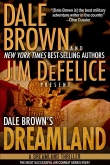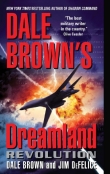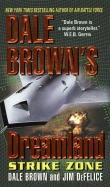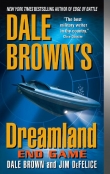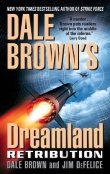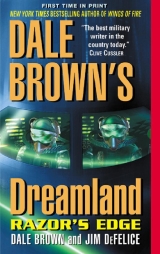
Текст книги "Razor's Edge"
Автор книги: Dale Brown
Жанр:
Боевики
сообщить о нарушении
Текущая страница: 14 (всего у книги 22 страниц)
“Something just nailed the Flighthawk,” said Mack Smith.
“Shit.”
“We got other problems. Hang tight. This is going to be a bitch.”
“We’re flying through the flak?”
“Close your eyes.”
IT WAS A WORTHLESS GESTURE, BUT MACK POUNDED THE
throttles for more speed, hoping to somehow convince the lumbering aircraft to get a move on. The air percolated with the explosions of the antiaircraft guns; the wings tipped up and down, and the tail seemed to want to pull to the right for some reason. Cursing, Mack did his best to hold steady, riding right through a wall of flak.
The helicopter was dead ahead, four miles, and coming RAZOR’S EDGE
261
at him, fat and red in the Bronco’s infrared screen.
Served him right for leaving the damn Sidewinders on the ground, he thought. Son of a bitch.
“Bronco, stand out of the way so we can nail that Hind,” said Alou.
“Thanks, Major, but where exactly do you want me to go?”
“Circle.”
“Fuck off. I can’t afford the gas, and sooner or later these bastards are going to nail me.”
The Bronco bucked upward, riding the currents into a clear space beyond the flak. Another ball of tracers puffed about a mile ahead.
“Take out the guns,” said Mack.
“Helo’s first,” said Alou. “They’re stopping the flak—they don’t want to hit him.”
“How sweet,” said Mack, tucking his wing to the left as sharply as he dared, then back the other way as the helicopter closed. He could feel the plane’s weight change dramatically and tried to compensate with his rudder, but the plane slid away from him. They flopped back and forth, the OV-10 alternately threatening to spin, stall completely, or roll over and stop dead in the air. The helo began firing, barely a mile from his face.
Aboard Raven , over Iraq 0050
SOMEWHERE FAR ABOVE HIM THE FLIGHT CREW TRADED
snippets of information on the location of the helicopter and the triple A. There was a warning—an AMRAAM
flashed from the belly of the Megafortress.
Fentress had only a vague sense of the world beyond 262
DALE BROWN’S DREAMLAND
the small area around him. His eyes were focused on the gray screen in front of him, his consciousness defined by the two words in the middle:
CONTACT LOST.
He was dead, nailed by the flak dealer.
Aboard Wild Bronco , over Iraq 0050
MACK SMITH SAW THE GAUGE FOR THE OIL PRESSURE IN
the right engine peg right and then spin back left. It could have been tracking the weight distribution of his plane—he could feel the assault team rolling back and forth in the rear with his maneuvers.
“Tell your guys to stop screwing around back there,”
Mack told Danny.
The captain made a garbled sound in reply, either cursing or puking into his mask.
Mack wrestled the stick to try to get back level. The Hind passed off to his right, its gunfire trailing but missing.
The stinker was probably going to fire heat-seekers next.
So where the hell was Alou and his magic missiles?
They weren’t that stinking close, for cryin’ out loud.
Mack pushed the stick forward to throw the Bronco into a dive. He tossed diversionary flares. A second later something whipped past his wings, trailing to the right after a flare. Something else exploded well off to his left.
A fresh volley of tracers kept him from gloating. The helicopter was still on his butt.
Mack slapped the stick and jammed the pedals, pushing the plane almost sideways. The Hind shot past, arcing to the right so close that Mack could have taken out his RAZOR’S EDGE
263
handgun and shot the bastard through the canopy. Instead he lurched left, figuring the helicopter was spinning for another attack. He tucked his wing and picked up a bit of speed and altitude north before tracers flared on his right once again. He thought he heard something ting the aircraft, but it could have been one of the Whiplash crew kicking against the side.
“Hey, Alou—any fuckin’ time you want to nail the raghead is okay with me,” he said, slapping the plane back left.
As he did so, a sharp downdraft pitched his nose toward the rocks. An AMRAAM from the Megafortress had found the Hind.
“Hey, there’s two more helicopters on the ground down there,” said Freah.
“We’ll save them for next time,” said Mack, pulling the plane level.
Incirlik
0100
JENNIFER TURNED FROM THE EQUIPMENT CONSOLE AND
put her head down to the laptop screen, rechecking the sequence she had to enter. She typed it without looking, cursed as she made a mistake, backspaced, then reentered. The others on the flightdeck—Breanna, General Elliott, the handsome but somewhat stuck-up colonel from CentCom, and the RIO they’d borrowed to help work the gear—all stared at her.
“Just a second,” she told them.
“We’re waiting for you, young lady,” said the CentCom colonel.
General Elliott looked like he’d strangle him. She’d always liked him.
264
DALE BROWN’S DREAMLAND
Jennifer studied the map again, then entered the last set of coordinates. She hit Enter; the laptop spit back the numbers without hesitation.
“So?” asked Breanna.
“It was definitely a laser flash. The gear got a pretty good read. But it wasn’t in that building Whiplash targeted,” Jennifer told them.
“Where was it?” asked General Elliott.
“According to the data, fifty miles inside of Iran.”
V
Allah’s Sword
High Top
30 May 1997
0154
DANNY FREAH PRIED HIMSELF OUT OF THE BRONCO’S
cockpit and walked to the back of the plane, where several Marines were already helping with the prisoner. The Iraqi had to be held upright; while he offered no resistance, the flight had turned his legs to jelly, and even with help he moved across the old asphalt like a toddler taking his first steps. The man kept looking to the sky, obviously unsure of where he was.
Then again, the same might be said of the Whiplash team, shuffling gear back and forth tipsily as they got out of the plane.
“You’re green, Powder,” Danny said.
“I ain’t never flying in an airplane ever again, Cap.
Never. No way. Not unless I’m pilot.”
“That’ll be the day,” said Nurse.
“Inventory and tag the gear; we’re routing it to the NSA,” said Danny, who’d already received the order to do so from Colonel Bastian. “Isolate the prisoner in an empty tent, then find out if the Marines have an Arab speaker. I’d like to see what the hell he does before we hand him over to CentCom.”
268
DALE BROWN’S DREAMLAND
“As soon as the place stops spinning, I’m on it,” said Powder.
High Top Base now looked like a small city, albeit one made almost entirely from tents. Whiplash’s two bulldozers, along with a small Marine vehicle, were working on the southern slope, grinding it down into a depot area to accommodate some of the supplies two C-130s had brought in for the Marines. Gators—revved-up golf carts with military insignia—charged to and fro with stacks of gear. Two platoons of Marines were extending the defensive perimeter along the road below; another company was erecting a temporary metal building twice the size of the Whiplash HQ trailer at the far end of the aircraft parking area to be used for maintenance work on the planes.
The runway would soon total three thousand feet; CentCom was hoping to use it as an emergency strip. In the meantime, air elements of the MEU(SOC)—six Harriers and six Cobra gunships—were due in late tomorrow or the next day to provide support for any Marine ground action in the Iraqi mountains to the south.
That might come soon. The rumble of artillery could be heard in the distance. The Iraqis were moving against their civilian population in the north. Unlike 1991, there had been no exodus of Kurds from the towns—an ominous sign.
Besides the Marines, a dozen technical people from Dreamland were due; they had been rerouted to Incirlik on the MC-17 to look after Quicksilver. As Danny understood it, the damage to the plane was much less than it might have been; the laser had managed to catch it with only a short burst, probably at the far edge of its range.
The experts believed this confirmed that it was using a barrage pattern to saturate an area based on minimal or primitive radar coverage. They also said it was possible that the laser had been thrown off by the partly stealthy RAZOR’S EDGE
269
profile of the big plane, or even the presence of the Flighthawks. In any event, Quicksilver would be back at High Top and available for action within a few hours.
Danny made his way to the medical tent, blinking at the bright lights inside. The EPW, or enemy prisoner of war, stood before the empty cot, eyes shifting nervously around. He either didn’t understand the corpsman’s gestures or declined to take off his clothes so he could be examined.
“We’re not going to hurt you,” Danny told the prisoner.
The man gave no indication that he understood anything Danny was saying; it wasn’t entirely clear that he could even hear.
“Can you examine him like that?” Danny asked the corpsman.
“I guess. He doesn’t seem to be hurt.”
“Get him something to eat and drink. Try and be as friendly as possible.”
“Yes, sir.”
“Do you guys have an Arab speaker?” Danny asked the corpsman.
“Not that I know of, sir.”
“All right. Go easy with him.” The man looked like he was in his late thirties or forties, but Danny suspected he was somewhat younger; he clearly didn’t eat well and probably didn’t have much opportunity to take care of himself. Danny had seen in Bosnia how war and malnu-trition aged people.
The man held up his shirt gingerly as the corpsman approached with his stethoscope. His ribs were exposed; he had several boils on his back.
“Take pictures,” Danny told the Marines. “I don’t want anybody accusing us of torture.”
“Yes, sir,” said the corporal in charge. “What do we call him?”
270
DALE BROWN’S DREAMLAND
“Call him ‘sir.’ Be as nice to him as possible. Nicer.
Treat him like your brother.”
“I thought I was supposed to be nice.”
Danny left the tent, heading toward his headquarters to update CentCom and then Dreamland Command on their arrival back at the base. He had just checked on the arrangements for a Pave Low to evacuate the parts and prisoner when the lieutenant he was talking to was interrupted. Another officer came on the line, identifying himself as a Major Peelor, an aide to CinC CentCom.
“Are my people hearing this right?” said the major.
“You have an Iraqi?”
“That’s right,” said Danny. “We’re shipping him to Incirlik so you and the CIA can debrief him. It’s all been arranged through—”
“You went into Iraq and kidnapped an Iraqi citizen?”
“I captured a prisoner. We believed he was part of the laser operation. Our guys think his site may have been coordinating the radar operations, but it’s too soon to—”
“Did you clear this with the lawyers?”
“Lawyers?”
“Taking the citizen.”
“He’s a soldier.”
“Did you clear it with the lawyers?”
“Why the hell would I do that?” asked Danny. “What lawyers?”
“Who approved this mission?”
“Look, Major, you don’t have the clearance for this conversation.”
Danny punched out the connection.
RAZOR’S EDGE
271
Dreamland Command Center
29 May 1997
1622
“DON’T WORRY ABOUT IT,” DOG TOLD DANNY. “I’LL HANDLE
CentCom. The left hand doesn’t know what the right hand’s doing over there. Send the prisoner to Incirlik as we said.”
“But what’s this bullshit about lawyers?”
The colonel stared at Danny Freah’s face on the screen at the front of the situation room. It was a tired, drawn face, one barely capable of suppressing the anger he obviously felt. “I haven’t heard anything about lawyers,” Dog told him honestly.
“Major Heller or Peelor, or whatever his fucking name, is accusing me of kidnapping an Iraqi citizen. Are we fighting a war here or what? What is it with these guys?”
Dog reached down to the console for his coffee. The cold, bitter liquid did nothing to relieve his own fatigue, but the pause let him consider what to tell his captain.
The absurdity of modern warfare—you needed a legal brief before taking prisoners. And all sorts of sign-offs and findings and cover-my-ass BS.
“I don’t know what Peelor is talking about,” said Dog.
“You don’t have to worry about it. You work for me, not CentCom. You proceeded on my authority, and you followed a lawful order.”
It was the mildest response Dog could give him, but Freah still looked like he’d been punched in the stomach.
“The prisoner goes to Incirlik to be debriefed and processed,” said Dog. “Quicksilver has been patched up and should be en route shortly. We’re pulling together everything we have on the site you hit. We’re pretty sure it was networking the radars, but we won’t be positive until the NSA analyzes the gear you took. Whether it’s related to 272
DALE BROWN’S DREAMLAND
the laser or not, at this point no one knows. You did a good job, Danny. Go get some sleep.”
Dog clicked the remote control in his hand, cutting the connection.
“Better get me General Magnus,” Dog told the specialist at the com board.
Over Turkey, en route to Incirlik
0400
JED BARCLAY THUMBED THROUGH THE PAGES OF SATELLITE
photos on his right knee, looking for the latest batch from the sector north of Baghdad. Finding what he was looking for, he pulled the sheets to the top, then compared them to radio intercepts culled by Raven the previous day and balanced on his left leg. Under his chin were troop reports provided by CentCom, but what he really wanted now was the preconflict CIA assessment listing likely commanders and their call signs; that was somewhere in the briefcase near his feet, unreachable without sending a flurry of papers through the cabin of the C-20H Gulfstream.
“Son, you look like you’re cramming for an exam,”
said General Clearwater, looming over him from the aisle.
“No, sir, just trying to work out some things.”
“And?”
“Well, sir—” A sheaf of papers fell from his left knee onto the seat next to him, starting a chain reaction of cas-cading paper as they knocked several files and an awkward pile of maps onto the floor. Jed looked up from the mess helplessly; the general stared at him as if he didn’t notice.
“Well, first of all,” Jed began again, “the barrage tactics had to have been carried out with the help of a network of spotters. The radars only come on after the aircraft pass two points in northern Iraq. I would guess that there’s at RAZOR’S EDGE
273
least one source in Incirlik, even though the NSA hasn’t filtered the intercept yet. The barrage spread of SAMs includes a Chinese missile based on the S-3, at least if the telemetry is to be believed. But given all that, the damage to the first plane and the Megafortress—at least those two, maybe the others—had to have been caused by a laser. And on the Megafortress, assuming the preliminary information from the AWACS is correct, it seems clear that the laser was operating independently. I’d like to speak to the Dreamland people once we’re down, but from everything I have here, there’s definitely a laser.”
“Where is it?”
“I don’t know. Razor works with a dedicated radar, similar to a traditional SAM site. But that’s not the only way to do it. From what I understand—and it’s not my area of expertise—the laser could fire through a gridded arc after an aircraft is detected by a long-range radar or some other system.”
“Run that horse at me again,” said Clearwater.
“Think of it this way,” said Jed. “You have a one-out-of-five chance to win a poker hand. You play a hundred rounds, you’d expect to win twenty times. Well, if the laser could cycle quickly enough—in other words, reload—it could fire one hundred shots into an area where it expected the plane to be. One shot out of X would hit.”
“I’ve known lucky poker players in my time,” said the general. “Played like they stepped in shit.”
“Yes, sir. The point is, you could fire through a grid where you thought the plane was and expect to get a hit a certain number of times. Of course, we have no idea how many times they’re firing. We don’t record the misses, just the hits. They may be really lousy shots.”
“We’ll keep your point in mind while we peek at the cards,” said Clearwater, clicking his false teeth.
“Sir?”
274
DALE BROWN’S DREAMLAND
“How’s your Arabic?”
“Uh, well, my top tier languages are German and Russian and of course—”
“Do you speak Arabic or not, son?”
“Well, I do, I mean at my last proficiency exam, I had a 4.2 out of five but there are different dialects. See, spoken standard Arabic, that’s one thing—”
“Good enough,” said the general. “Your friends at Dreamland have found us someone they think may be a radar operator. He’s inbound at Incirlik right now. CIA’s going to handle the debrief with some of our people, but I’d like you to take a shot at it as well. CIA officers with language skills are all south of the border at the moment.”
“We, uh, we’re—”
“They’ll hold the horse until we get there.”
“Uh, I was, uh, thinking I might, uh, sleep, sir. I haven’t slept in—”
“You have twenty minutes before we land. Hop to it, son.”
“Yes, sir.”
On the road near Saqqez, northwestern Iran 0500
IN THEORY, BRIGADIER GENERAL MANSOUR SATTARI COMmanded the Iranian Air Force and its nearly five hundred aircraft. In theory, the click of his fingers could summon four fully equipped squadrons of MiG-29U Fulcrums and six slightly less capable F-5E Tiger IIs, two dozen MiG-27 fighter-bombers, a handful of F-14As and Phantom F-4D and F-4Es, a host of support aircraft, and nearly forty helicopters.
In reality, Sattari’s command came down to a single Fokker F.28 Friendship VIP transport, which was actually RAZOR’S EDGE
275
listed under a French registry. True, he could count on the loyalty of several squadron commanders if called upon to fight—but only if he could reach the men personally.
Brigadier General Mansour Sattari, a veteran of the re-volt against the Shah, a decorated fighter pilot who had personally led attacks against Baghdad during the Martyrs’ War, had come to symbolize the demise of the once great Iranian Air Force, and Iran itself. A few short weeks before, his mentor and friend General Herarsak al-Kan Buzhazi, the supreme commander of the Iranian armed forces, had been outmaneuvered in a power struggle with the imams; he had been assassinated just minutes after meeting with the Ayatollah and learning the full depth of his humiliation. Even worse than Buzhazi’s ignoble death were the Chinese troops that had entered the country at the Ayatollah’s invitation; those troops now effectively controlled the country.
And so as he bent toward Mecca to say his morning prayers, he did so with honest humility, knowing first-hand how the God of all could show his overwhelming power even to the most just of men. Sattari did not pre-sume to know why Allah did what He did, nor would he dare question the path the world took. He knew only that he must act according to his conscience and not his fear.
His actions must ultimately be judged not by those on earth or even those who claimed to know God’s will, but by God Himself.
Sattari was also a realist. And as he rose at the end of his prayers, still in a contemplative mood, he looked briefly in the direction of Iraq, the lifelong and enduring enemy of the Iranian people. For it was there that hope lay for his people. If the infidel Chinese were to be removed, if the cowards who hid behind their black robes in Tehran were to be taken from the stage, the Iraqi devils must play their role.
276
DALE BROWN’S DREAMLAND
Thus far they had done so even better than Sattari had hoped. Seeking a solution to the Kurdish problem once and for all—a problem largely encouraged by Buzhazi before his demise—Saddam Hussein had em-barked on a typically reckless plan of simultaneously tweaking the Americans and attacking the Kurdish Pesh-marga, or “freedom fighters,” in their homeland. Kicking out UN inspectors, aggressively launching surface-to-air missiles—the Iraqi actions were so well-timed that Sattari had considered holding back his own plan to use the stolen laser. Unfortunately, the Iraqi tactics had proved inadequate to provoke a large American response; it was only when Sattari began shooting down the American and British aircraft that the westerners had become sufficiently enraged to launch an all-out attack. Sattari had to carefully coordinate his attacks with the Iraqi radar and SAM launches to make it seem as if they were responsible. This had limited his target possibilities and made his timetable beholden to the Iraqis as much as the Americans. Still, the first phase of his plan had met its objectives. American troops were streaming into the region; more significantly, American diplomats were sounding the Iranian government out about a tentative rapprochement.
The next step involved his few allies in the diplomatic corps, who must strike a deal worth kicking the Chinese out for. Sattari did not feel that would be too difficult; the Chinese were not liked, even by the black robes, and they had already brought the country considerable pain. Nor did the Americans want much from Iran, beyond the assurance that they would not help Saddam—an assurance very easily given. Some small thing might move the talks along—an American air crew downed near the border and recovered, turned over after being treated as honored guests.
RAZOR’S EDGE
277
With the Chinese gone, Sattari could move on to the third and final phase of his plan—restoring the military, and the air force, to its proper place.
Sattari did not want power in the government. Nor did he necessarily believe that his plans would succeed. Ever the realist, he saw them as fulfilling his duty rather than his ambition. For the alternative—the Chinese, the black robes—meant quasi-servitude, if not death for his country.
And certainly death for himself. The ayatollahs blamed the Americans for Buzhazi’s death. It was possible—
Sattari had flown with them during the early days, and knew their cunning. They had certainly helped foil General Buzhazi’s plans. But it was just as likely that the black robes themselves had killed the general, or at least allowed the Americans to do so.
Sattari did take some satisfaction in the fact that his country’s enemies would be used to liberate it. He hated Iraq beyond rational measure. It was not enough that Sattari’s younger brother died in the Martyrs’ War; the bastard Saddam had killed his mother and father with a Scud missile attack against their city. The day the American President Bush had stopped the so-called Gulf War without killing the dictator even now rated among the saddest of Sattari’s adult life.
The general walked back to his Range Rover, nodding at the driver before getting in. Two other SUVs with handpicked bodyguards sat twenty yards back on the road, waiting. Another was traveling about a quarter mile ahead.
“To Anhik,” he told the driver, using the name of the village near the laser compound. “As planned.”
The driver nodded and silently put the truck in gear.
Sattari turned his attention to the countryside over the course of the next hour, studying the mountains as they shrugged off the last of the winter snow. Ice mingled with 278
DALE BROWN’S DREAMLAND
bursts of green. A small herd of animals—goats, most likely—moved along the side of the road, prodded by a pair of young women dressed in heavy peasant garb, except for their boots. As a child, General Sattari had heard stories that made the Kurds out to be demons. As a young man he had looked down on them as ethnically inferior louts. But his experience with them following the Martyrs’ War had shown they were at least as competent and brave as any other Iranian soldier—high praise, in his mind. The fact that his complex at Anhik was staffed pri-marily by Kurds was in fact something of a comfort; he knew the men could not be corrupted by either the Chinese or the black robes.
The two men at the gate waited until they saw him nod before stepping back to let the Rovers pass. They held stiff salutes despite the wind-strewn dirt.
The site had been built during the Shah’s last years, with the intention of constructing a tractor factory; it had in fact been used to construct some mowing equipment but had lain idle for at least two years before Sattari acquired it as one of the air force’s top-secret warehouse sites. It had housed a stockpile of Russian air-to-air missiles. These were now long gone, some expended in the futile Persian Gulf action, and more, Sattari suspected, stowed aboard the Chinese vessels that had sailed from the country after the struggle that brought Buzhazi down.
A debt to be paid, along with many others.
They had started building the laser here nearly eighteen months before, when overtures by the Chinese made it clear that the hills kept it shadowed from American spy satellites. It was not completely bereft of coverage, of course—no place on earth seemed to be—but the Chinese intelligence had made development possible.
The laser had been Buzhazi’s most closely guarded se-
RAZOR’S EDGE
279
cret and his prized weapon. It was based largely on plans for the American “Razor,” an antiaircraft weapon which, at least according to the specifications Sattari had seen, was considerably more accurate at a much farther range than his device. Razor was also considerably smaller, and mobile. It wasn’t just that the Americans had better computer technology; they had found a way to propagate the energy beam much more efficiently and with different gases. And their superior manufacturing abilities undoubtedly played an important role.
But his scientists were doing well, better even than they had expected. The laser was housed in a long shed-like building with roof panels that could be slid open to target an aircraft. The mechanism looked as if it had been pilfered from a planetarium—and a sewage treatment plant. Pipes ran in two large circles and from both sides of the plants. Wires crisscrossed thick cables. Computer displays stood in two banks on steel-reinforced tables; more work stations were said to be networked here than in all the rest of Iran, outside the capital.
Sattari, not a particularly scientific man, had been somewhat disappointed on his first inspection. He’d expected to see something more like the devices in the American Star Trek movies. When the inventors described the use of the chemical gases to create a focused beam, they sounded more like cooks than weapons specialists.
Nonetheless, he could not be happier with the results.
His caravan passed a small battery of Hawk missiles and headed toward the main building. Hidden under camo netting, the missiles dated from the Shah’s era, and the crews manning them had never been able to launch one, even in training; they were too precious. Their best protection was stealth and the Americans’ obsession with Iraq. The laser could not be protected against a concentrated air attack, and he had quartered a hundred-odd men 280
DALE BROWN’S DREAMLAND
here to guard against the Chinese and black robes, not the Americans, who in any event wouldn’t attack by ground.
Because of the secrecy of the project—and also because some of the scientists who worked here were not as en-lightened about Kurds as Sattari—the soldiers were kept from the main compound by a double row of barbed-wire fence.
Sattari’s vehicle stopped near the underground tunnel that led to the laser shed as well as a bomb shelter off to the side. He liked to start his inspections here, as it allowed him to get into the very heart of the laser shed almost immediately, in effect taking the scientists there by surprise. But today it was his turn to be surprised, for as he got out of his vehicle, two figures stepped from the underground steps. One was Sattari’s commander here, Colonel Kaveh Vali. The other, considerably more ominous though nearly a foot shorter than the colonel, was Shaihin Gazsi, Ayatollah Khamenei’s personal representative to the air force.
Sattari felt the blood vessels in his neck pop as Gazsi approached. Khamenei had shown his considerable disdain for Sattari by appointing a woman to represent him.
“General, I see you have finally arrived,” said Gazsi.
Barely thirty, she seemed to rise above the traditional feminine garb, her veil and headdress fluttering behind her as if struggling to catch up. Her nose might be a half centimeter too long, but otherwise she would be a perfect beauty.
If she weren’t such a bitch.
“And you? Why are you here?” he said. He was, of course, surprised to discover that his secret was no longer secret, though this was the best he could do to hide his shock.
“You will address me with respect,” said Gazsi. “I am the Ayatollah’s representative.”
RAZOR’S EDGE
281
His whore, perhaps, though Sattari doubted the old bastard could get it up.
“Why are you here?” he repeated.
“The Ayatollah wishes to speak with you immediately.”
“I am at his service,” said Sattari. “I will leave in the evening.”
“You will leave now,” she said. “My helicopter is prepared for you.”
“I will leave this evening,” said Sattari. He caught the worried look on Colonel Vali’s face. “Or sooner, if my business here is completed before then.”
“I suggest you conclude it within twenty minutes. I will wait,” said the horrible woman as he descended the stairs, Vali in tow.
High Top
0600
ZEN UNHOOKED HIS CHAIR FROM THE ELEVATOR MECHAnism on Quicksilver’s access ladder and began wheeling himself slowly toward the Whiplash HQ trailer. He kept looking for Fentress, dreading seeing him yet knowing he had to talk to him.
But what would he say?
No more time to rehearse—he was standing just outside the Whiplash trailer, nursing a cup of coffee.
“Yo, Fentress, rule number one, don’t break my plane.”
Zen meant it, or wanted to mean it, as a joke, something to break the tension. But Fentress looked down at the ground and seemed nearly ready to cry.
“Hey, don’t worry about it,” Zen said, wheeling over to him. “I’m busting your chops. It wasn’t your fault. Right?”
“Major Alou wanted me to take the mission,” mumbled Fentress.
282
DALE BROWN’S DREAMLAND
“You did okay. Really.” Zen knew his words sounded incredibly phony. But what else could he say?
Well, for starters, that he shouldn’t have flown. But like the kid said, that had been Alou’s call.
Alou should have checked with him—a point Zen had already made, though Alou had dismissed it. The kid had done damn well under the circumstances, Alou had argued.

